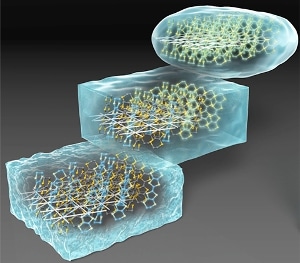Oct 24 2017
Researchers at Tohoku University have gained new understanding into the electronic processes that monitor the transformation of liquids into a glassy or solid crystalline state.
 Electrons transition from a liquid state (top) to a glassy state (bottom) upon cooling. Credit: Tohoku University
Electrons transition from a liquid state (top) to a glassy state (bottom) upon cooling. Credit: Tohoku University
Since ancient times, the capability of some liquids to change into glass has been exploited. However, a number of fundamental aspects of this transition phase are far from understood. Enhanced understanding could boost the development of new products, such as blue ray discs or DVDs that store data by modifying their state of matter from one to another, and of new glass materials.
A multi-institutional Japanese team, headed by Kenichiro Hashimoto of Tohoku University's Institute for Materials Research, brought about a comparison of the molecular dynamics of glass formation in standard liquids, such as glucose, to an organic metal material comprising of 'frustrated' electrons. These electrons are responsible for conducting electrical currents, and are not able to reach their lowest energy state because of the way they are geometrically arranged on the crystal lattice of the material.
Slow cooling of standard glass-forming liquids causes their atoms to arrange themselves into steady arrangements, developing a crystallized material. The metal’s frustrated electrons similarly organized into a regular pattern and then crystallized when the Researchers slowly cooled the organic metal they were testing. However, when the material was cooled in a more rapid manner, crystallization was prevented and the material's frustrated electrons re-organized, changing into glass in a similar way like the standard glass-forming liquids.
The universal nature of the liquid-to-glass transition phase is highlighted by the results.
The Researchers assume that their organic metal provides a convenient test platform for analyzing the basic properties of the liquid-to-glass transition.